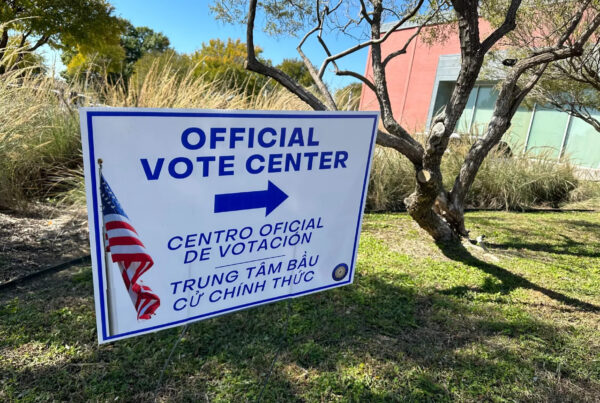Every election cycle, prominent Texas Democrats claim the state is, or is almost, a swing state. Last month, Beto O’Rourke may have coined a new term when he called Texas “a sleeper battleground state.”
But to be a battleground means either party has a legitimate chance at capturing a state’s electoral votes, or the state has a history of electing leaders from both parties. Texas doesn’t check either of those boxes.
But just because the blue wave likely won’t be crashing in Texas, doesn’t mean this year’s elections won’t have any surprises.
In his latest for The Dallas Morning News, Gromer Jeffers Jr. assessed the state of elections in Texas. He joined Texas Standard to talk about what he’ll be watching for this November. Listen to the interview above or read the transcript below.
This transcript has been edited lightly for clarity:
Texas Standard: Two races, of course, are dominating the political conversation in Texas – the presidential race, and then Democrat Colin Allred challenging Republican Sen. Ted Cruz. Let’s start with the very top of the ticket. What are you watching for there?
Gromer Jeffers Jr.: The consensus is that Donald Trump will win Texas. And you can tell that because neither candidate, Trump or Kamala Harris, is campaigning here.
But I’m looking to see what the margin is. Trump beat Joe Biden in 2020 by about five and a half percentage points. That’s not really a lot when you think about Texas being red and that a Democrat hasn’t won since 1994.
So if Harris can close that gap or keep it the same or maybe get within three, that could help down ballot Democrats in Texas. And the flip side: if Trump runs wild, that will help Republican candidates down ballot.
Well, you seem to think Trump winning in Texas is a foregone conclusion. But what about just a level below that? I mentioned Beto O’Rourke in the lead. His challenge to Sen. Cruz got a lot of attention. Where do you think Collin Allred is right now?
That’s a fascinating question. Most polls show this a single digit race. I mean, look, you look at the the University of Houston-Texas Southern poll from August, it has Cruz leading by two points. Emerson had it at four, the Texas Politics Project, eight points.
But any way you slice it, that race is competitive. And given that Cruz beat O’Rourke by only 2.6 percentage points, it’s going to be a battle. The question is, can Allred push the rock all the way over the hill? We’ll see how that plays out. He certainly has money. It’s a single-digit race, but can the Democrat come all the way and win?
» RELATED: A familiar refrain: Some polls say Texas could turn blue, but can they be trusted?
Well, is it worth looking a little further down the ticket – the state House or Congress? Do you expect to see any change at those levels?
There are a couple of races across the state that are competitive.
But when you look at the Texas House, the Senate and the congressional races, the fact that we have so few contests that you can call really, really heated, that shows you where Texas is. Now, a lot of that is redistricting and gerrymandering and incumbency protection.
Well, many predicted that demographic shifts in Texas would create more Democratic voters. The state’s population is getting more urban and racial and ethnic populations are growing. So why haven’t Democrats been able to capitalize on these shifts?
There has been progress, but that predicted flip because of demographics hasn’t happened.
I think the message is one issue. Democrats struggle to tailor a Texas-centric message. They get pulled into the debate over national issues. In a lot of states, when you break through in a swing state, you break through because you connect with voters on a sort of a neighborhood and a block level. You become a Texas Democrat and not just a Democrat.
And so Republicans have shown that if Democrats want to break through there, they’re really going to have to fight and really have to be better with messaging and connecting with voters.




















